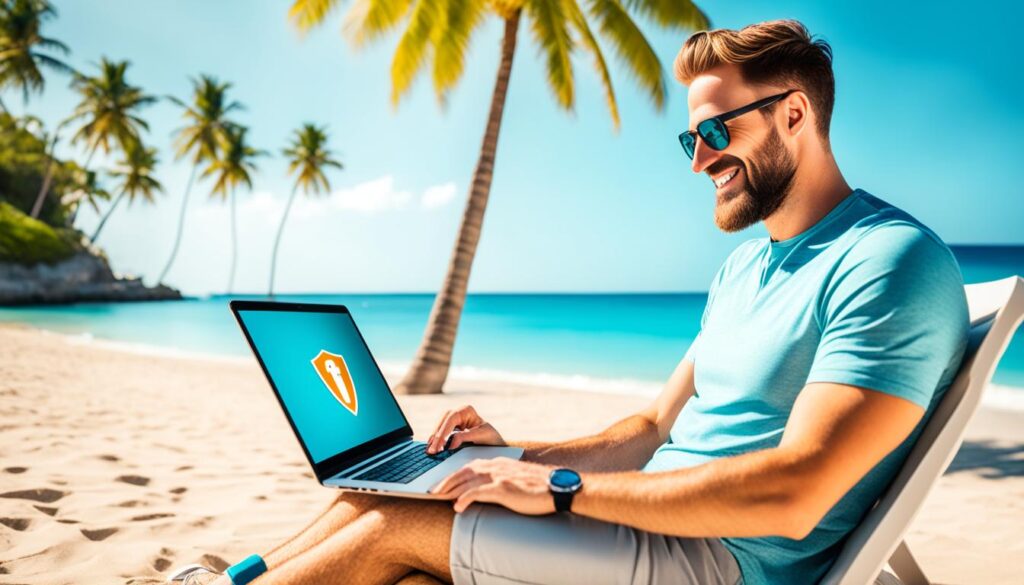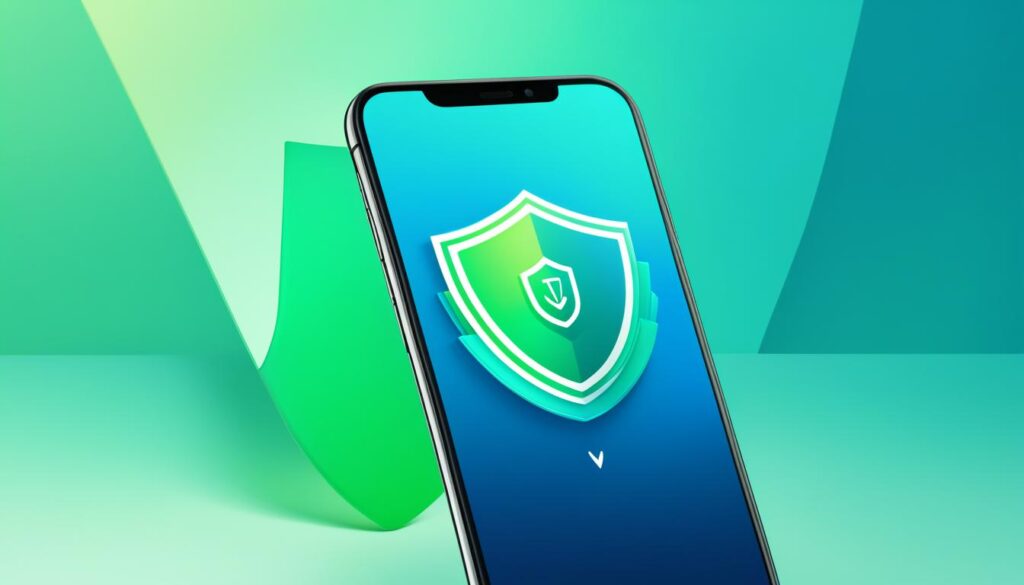Being a heavy user of VPN Mobile Phone, I always look for the top virtual private network smartphones. These keep my internet use safe and my encrypted mobile data. They are perfect for trips, making my mobile privacy protection a priority. I will suggest the best VPNs for travel, what to think about when picking one, and how to set them up. I’ll also share advice on traveling with a VPN. This is ideal for securing public Wi-Fi, overcoming mobile internet security blockades, or reaching geo-blocked content. The right VPN is a must-have for every traveler.
Key Takeaways
- VPNs offer crucial security and privacy with mobile network anonymity when on the move, keeping your data safe on public Wi-Fi connections.
- Choosing a VPN for trips means checking its server reach, security, what devices it works with, its speed, and if it supports streaming.
- I recommend NordVPN, ExpressVPN, and Surfshark for travelers. They are reputable, offer great performance, and are good with mobiles.
- To boost your online safety while traveling, correctly setting up your VPN – like using a kill switch and picking nearby servers – is smart.
- VPNs are also handy for remote mobile access and mobile hotspot shielding, adding another layer of comfort and safety while traveling.
Importance of VPNs for Travelers
VPNs are critical for online safety when you travel. Using public Wi-Fi at places like airports and cafes can expose your data to hackers. A VPN keeps you safe by hiding your IP address and encrypting your data.
Privacy and Security on Public Wi-Fi
Public Wi-Fi is risky because hackers can easily access your info. With a VPN, your online actions are hidden, protecting you from these threats. So, using a VPN on public networks keeps your data safe.
Accessing Region-Restricted Content
A VPN lets you watch shows or access work content from anywhere. It makes websites think you’re in the right location, giving you access. This way, you can use the internet freely around the globe.
Bypassing Censorship and Surveillance
In some places, the internet is highly controlled. A VPN lets you bypass these measures, keeping your browsing private. It ensures you can freely access information and communicate in these regions.
Factors to Consider When Choosing a VPN for Travel
Choosing the right VPN for travel involves many factors. You should think about the size of the VPN server network and its security. Also, consider if it works on the devices you use and its speed. These points will greatly affect your VPN experience.
Server Network and Locations
A VPN with many servers across the world is vital for travelers. It lets you connect to a server close by, reducing delays and unlocking blocked content. Always check the number of servers and countries a VPN covers before picking one.
Privacy and Encryption Standards
Vital for your online safety, look for a VPN that uses strong encryption and keeps no logs. A provider with AES-256 encryption and a strict no-logs policy will keep your browsing secure and private.
Device Compatibility
For a VPN to be travel-friendly, it must work on your most-used devices. It should have apps for iOS and Android. Also, make sure it’s compatible with your other devices, like laptops, for your travel VPN needs.
Connection Speeds
Staying connected while traveling means needing fast internet. Your VPN should offer fast and reliable speeds. This will let you enjoy streaming, video calls, and browsing without any lag.
Streaming and Torrenting Support
If you plan on streaming or using P2P while travelling, pick a VPN with strong support for these. Some VPNs limit these activities so it’s important to choose one that meets your needs.
Factor |
Importance for Travelers |
Example Top Providers |
|---|---|---|
VPN Server Network |
High – Broad global coverage enables access to content and servers near your location |
NordVPN (5,400+ servers in 59 countries), ExpressVPN (3,000+ servers in 94 countries) |
Privacy and Encryption |
High – Protects your online activities and personal data from eavesdropping |
Surfshark (AES-256 encryption, no-logs policy), ProtonVPN (Swiss-based, audited no-logs) |
Device Compatibility |
High – Ensures seamless VPN use across your mobile, tablet, and laptop devices |
NordVPN (apps for iOS, Android, Windows, macOS, Linux), ExpressVPN (wide device support) |
Connection Speeds |
High – Maintains fast, reliable internet access for activities like streaming and browsing |
ExpressVPN (known for fast, consistent speeds), Surfshark (optimized for performance) |
Streaming and Torrenting |
Medium – Enables access to geo-restricted content and P2P file sharing |
NordVPN (supports streaming and P2P), CyberGhost (optimized for streaming and torrenting) |
Looking into these aspects will help you choose a VPN that’s secure, private, and fast. This ensures you stay safe and connected during your travels.
Top VPN Recommendations for Travelers
When it comes to the best VPNs for travelers, NordVPN, ExpressVPN, and Surfshark shine. I’ve used them for years and they always meet my needs. They offer great features and performance.
NordVPN
I find NordVPN easy to use and it connects fast. It’s great for streaming on the go. NordVPN has servers in 111 countries. It’s good for P2P sharing and streaming. It also has extra security like Double VPN.
ExpressVPN
ExpressVPN offers super speeds and reliable connections. They have servers in 90 countries. This means you can find a good server wherever you are. Their app is easy to use and they have customer support around the clock.
Surfshark
If you’re watching your budget, Surfshark is an excellent choice. It doesn’t sacrifice speed or security. Surfshark supports many devices at once. This is perfect for travelers with lots of gadgets.
VPN Provider |
Server Network |
Privacy and Encryption |
Speed and Performance |
Pricing |
|---|---|---|---|---|
NordVPN |
Over 5,500 servers in 111+ countries |
AES-256 encryption, No-logs policy, Automatic kill switch |
Consistently fast speeds, Supports P2P and streaming |
$3.71/month for a 2-year plan |
ExpressVPN |
3,000+ servers in 94 countries |
AES-256 encryption, Strict no-logs policy, Network Lock kill switch |
Blazing-fast speeds, Reliable connections |
$8.32/month for a 1-year plan |
Surfshark |
3,200+ servers in 100+ countries |
AES-256 encryption, No-logs policy, Camouflage Mode |
Consistently fast speeds, Unlimited device connections |
$2.49/month for a 2-year plan |
NordVPN, ExpressVPN, and Surfshark are your best bets for VPNs. They each have something unique to offer. Whether it’s quick speeds, worldwide coverage, or savings, these VPNs have your back. They’ll keep you safe and connected on your travels.
VPN Mobile Phone
Our phones are our go-to travel buddies, and NordVPN’s mobile app was top-notch. It opened quickly on iOS and Android, perfect for hopping on a train. The auto-connect option kept us safe when using any network. Plus, Threat Protection defended us from bad sites and ads, making our journey worry-free.
Mobile VPN Apps
Mobile VPN apps from NordVPN are easy to use and secure. Finding a server is simple, and connections are fast. With VPN for mobile phones, staying safe online is a breeze.
Secure Mobile Browsing
Keeping your data safe on the move is key. NordVPN’s app helps by blocking harmful websites and ads. This means you can use public Wi-Fi with confidence, knowing your information is safe.
Mobile Privacy Protection
Protecting your phone is vital when you’re away from home. NordVPN makes sure your data stays private with strong encryption. Even on public networks, your online actions are hidden from view.
Setting Up a VPN on Your Mobile Device
Setting up a VPN on your mobile device is easy. Big names like NordVPN, ExpressVPN, and Surfshark have apps for iOS and Android. Just download, sign up, and follow the steps to connect to a VPN server. These apps can also connect automatically to keep you secured with a VPN on Wi-Fi or mobile data.
For travelers, getting a VPN ready is fast. Install the VPN app on your device. Then, pick the best or nearest server with a few taps. This keeps your web activities encrypted and protected wherever you go.
VPN Provider |
Mobile App Availability |
Ease of Setup |
Security Features |
|---|---|---|---|
NordVPN |
iOS, Android |
Intuitive, with automatic connection options |
Military-grade encryption, kill switch, DNS leak protection |
ExpressVPN |
iOS, Android |
User-friendly, with a simple one-tap connection |
Robust encryption, split-tunneling, Network Lock (kill switch) |
Surfshark |
iOS, Android |
Straightforward setup, with a clean mobile interface |
AES-256 encryption, MultiHop, Camouflage Mode |
Using a VPN is key for travelers. Setting up a good VPN on your device takes just minutes. This shields your online info even on public Wi-Fi, keeping you safe from data theft.
Tips for Using a VPN While Traveling
When traveling, be careful which Wi-Fi you use, even with a VPN. Some public hotspots might not be safe. Try to use Wi-Fi from trusted sources, like your hotel or well-known businesses.
Connecting to Trusted Wi-Fi Networks
Connecting to Wi-Fi you trust helps keep your online activities safe. This is key when using public Wi-Fi. It protects you from possible cyber threats at unsecured hotspots.
Enabling Kill Switch and DNS Leak Protection
Using features like a VPN kill switch and DNS leak protection adds extra online safety. A kill switch stops your device from connecting to the internet without the VPN. This prevents showing your real IP address. DNS leak protection makes sure your online traffic goes through secure DNS servers, not your ISP’s less secure ones.
Choosing Nearby Server Locations
It’s better to pick VPN servers close to your current location when traveling. This can help you get faster and more reliable internet connections. Especially good for streaming, video calls, or any real-time use that needs a strong internet link.
These tips can make your online experience safer and smoother wherever you are in the world.

Virtual Private Network Smartphones
Being a regular traveler, a virtual private network (VPN) is a must on my smartphone. It keeps my online info safe and secure. A VPN makes sure my mobile data is encrypted, hiding it from anyone trying to snoop, even on public WI-Fi.
Encrypted Mobile Data
A VPN on my phone means my data stays safe and private. It’s key when I’m on public Wi-Fi, as these networks can leave me open to cyber threats.
Mobile Internet Security
A VPN isn’t just about data encryption. It also boosts my internet connection’s security in general. By hiding my IP and going through a secure server, I protect my device from malware and hacks.
Remote Mobile Access with VPNs
Virtual private networks, or VPNs, are great for remote mobile access during trips. They let you connect to a server safely. So, you can reach stuff from home or work anywhere, even in other countries. This is super helpful for getting to files or apps that you can only find locally. It’s great when you’re not at your main place.
A VPN for remote access keeps your connections secure while you travel. It lets you use your home or work network like you’re there. This means getting to shared drives, tools, and other things easily and safely. Your data and what you do are always protected.
This kind of remote mobile access is key for people who travel for work or fun. With a good VPN, you can keep working or stay connected, feeling relaxed. Your productivity and safety are assured, no matter where you go.

Mobile Hotspot Shielding
As a frequent traveler, I rely a lot on my mobile hotspot to keep me connected. It’s crucial to know that even a personal hotspot can face risks. These include the chance of someone getting into your connection or monitoring what you do. A VPN is very helpful in these situations.
Mobile Network Anonymity
When you link to a VPN on your mobile hotspot, you make your network private. This ensures your online actions are hard for others to see. The VPN turns your internet usage into secret code. It hides where you truly are. This is vital if you’re viewing private info on the web in public places.
Keeping your network nameless is key, especially if you’re connecting lots of devices to your hotspot. Devices like laptops, tablets, or other phones can be protected. A VPN puts up a safe path for all your internet use. This guards the whole network from risks.
A VPN isn’t just for securing your hotspot; it also keeps your mobile device safer. By concealing your online character and scrambling your data, the VPN keeps your personal details secure. This holds true even when you use public Wi-Fi.
Limitations and Drawbacks of Using VPNs
VPNs have a lot of good points for travelers. But, there are some issues to watch out for. One old problem is VPN speed throttling. Your VPN might slow down your internet on purpose. This happens to save data and network resources. You might see this most when you’re on a far-away server or at busy times.
Speed Throttling
It’s not fun when your VPN makes everything slow. This could be a problem when trying to stream videos or download big files. Some VPNs cut their own speeds to make sure they have enough resources. This leads to slower internet, video buffering, and a generally bad experience.
Compatibility Issues
Using a VPN might not always be smooth, especially on the road. VPN compatibility issues can arise. Even though top VPNs have apps for phones and tablets, they might not always work perfectly with your device. This can cause connection problems or make apps stop working. Such tech issues can disrupt your online time.
Cost Considerations
Another thing to think about is the cost of a VPN, especially for people who travel a lot. VPNs usually cost money, and these costs can build up. But they are an investment in your safety, privacy, and your ability to access online content anywhere you go. It’s smart to think about how much you’ll use a VPN versus its price and the benefits it offers.
Conclusion
Using a VPN is key for travelers wanting to keep their online life safe. It helps with privacy, security, and watching content while away. Think about things like the server network, how fast it is, which devices it works on, and the price. This will help you choose the right one, such as NordVPN, ExpressVPN, Surfshark, or another top choice.
A good VPN lets you browse the web safely and see content blocked in some places. This is crucial when using public Wi-Fi, as it can otherwise be easy for hackers to steal your info. By scrambling your data and hiding your IP address, a VPN gives you the confidence to use your devices without worry.
Adding a VPN to your travel gear is a wise move for your digital safety. It’s useful for watching shows, checking important info, or just surfing the net. A VPN is a great tool for making sure your online activities are private and secure while on the move.



